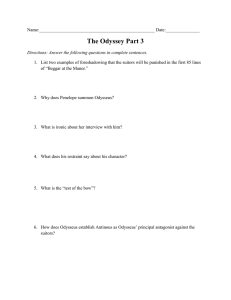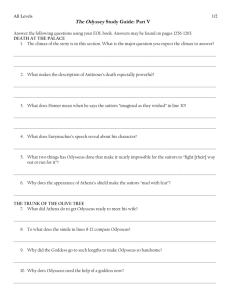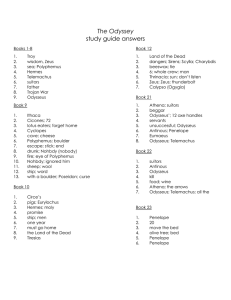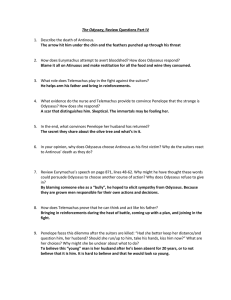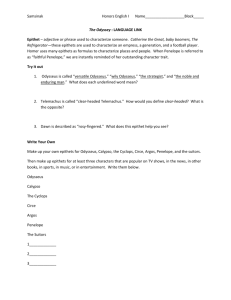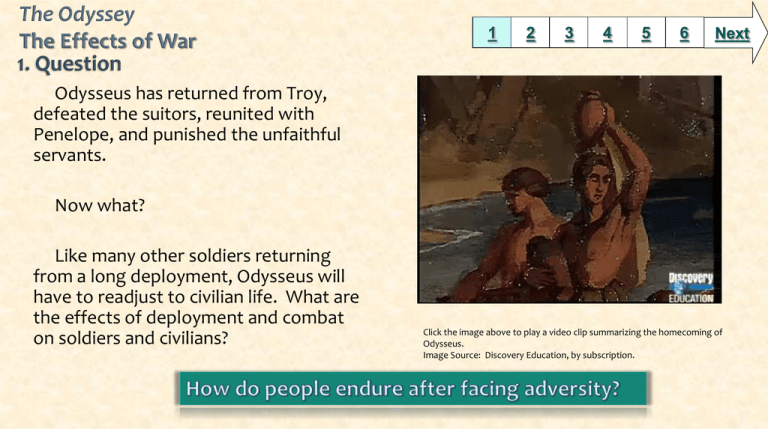
1
2
3
4
5
6
Next
Odysseus has returned from Troy,
defeated the suitors, reunited with
Penelope, and punished the unfaithful
servants.
Now what?
Like many other soldiers returning
from a long deployment, Odysseus will
have to readjust to civilian life. What are
the effects of deployment and combat
on soldiers and civilians?
Click the image above to play a video clip summarizing the homecoming of
Odysseus.
Image Source: Discovery Education, by subscription.
1
2
3
4
5
6
What are the effects of combat and extended deployments on
soldiers and civilians? How can they overcome them? Review some of
the following sources of information (you will need headphones):
Definition of PTSD
Facts about PTSD
Diagnosing PTSD
US Struggles with Surge of Returning Veterans
Combat Fatigue in Okinawa During WWII
Unpublished Autobiography of a WWII Veteran
Afghanistan Veterans Struggle
Iraq Veterans and Combat Stress
Funding for Mental Health Services
POW WWII Veteran Helps Other Soldiers
Army Suicides
Emotional Cost of War
Soldiers Write Their Stories
Families Struggle with Reintegration after Persian Gulf War
Drug Use after Deployment
Click the image above to view a film clip about a
doctor investigating methods to erase traumatic
memories.
Image Source: Discovery Education, by subscription.
Next
1
2
3
4
5
6
Review the resources on slide 2 to
discover issues common to soldiers
returning from deployment and/or
combat. Use this organizer to record
your findings. This information will
assist you in completing the next step
of the task.
Odysseus slaying the suitors, detail of a red-figure skyphos
from Tarquinii, c. 450 bc; in the Staatliche Museen zu Berlin,
Ger.
Image Source: Britannica.com
Next
1
2
3
4
5
6
Next
Using the information collected
on your organizer, compare the
actions of Odysseus upon his return
with those of more contemporary
soldiers.
Your entry will be scored using
this rubric or another method as
specified by your teacher.
Odysseus and Penelope by Johann Heinrich Wilhelm Tischbein
Image Source: Wikimedia Commons
1
2
3
4
5
6
Consider how Penelope will have to readjust
to Odysseus’s return. Review the following
resources:
A Minnesota soldier returns home from Iraq in 2007.
Image Source: Wikimedia Commons
Returning to Homelife after Deployment
Reintegration from the Spouse’s Perspective
Tips for Spouses
Veterans Administration’s Guide for Families
Then compose a journal entry or blog entry
from the perspective of Penelope. You may use
Kidblog, PicLit or another tool as approved by
your teacher.
Next
1
Grade Level and Content Area
2
3
4
5
6
Time Frame: One 90-minute lesson
BCPS Curriculum / Grade 9
Common Core State Standards
Reading: 1. Read closely to determine what the text says explicitly and to make logical inferences from it;
cite specific textual evidence when writing or speaking to support conclusions drawn from the text.
Writing: 7. Conduct short as well as more sustained research projects based on focused questions,
demonstrating understanding of the subject under investigation.
Standards for the 21st Century Learner
1.1.6 Read, view, and listen for information presented in any format (e.g. textual, visual, media, digital) in
order to make inferences and gather meaning.
2.1.3 Use strategies to draw conclusions from information and apply knowledge to curricular areas, realworld situations, and further investigations.
ISTE NETS - National Educational Technology Standards for Students
3. Research and Information Fluency: Students apply digital tools to gather, evaluate, and use information.
b. Locate, organize, analyze, evaluate, synthesize, and ethically use information from a variety of
sources and media.
4. Critical Thinking, Problem Solving, and Decision Making: Students use critical thinking skills to plan and
conduct research, manage projects, solve problems, and make informed decisions using appropriate
digital tools and resources. c. Collect and analyze data to identify solutions and/or make informed
decisions.
Differentiation strategies for this lesson:
Direct students to use learning tools included in our BCPSlicensed databases, such as: audio read-aloud, labeled reading
levels/Lexiles, and embedded dictionaries.
Learning Styles addressed in this lesson:
Field dependent, field independent, global, auditory, visual, tactile.
Notes to the teacher:
Collaborate with your school library media specialist to
implement this lesson.
Headphones/speakers will be necessary for the video segments
in this module.
Please preview segments as some veterans’ stories may be
intense for some students.
Last updated: July 2014 Created by Heather Jennings, STAT teacher
BCPS Slam Dunk Research Model, Copyright 2013, Baltimore County Public Schools, MD, all rights reserved. The models may be used for educational, non-profit school use only.
All other uses, transmissions, and duplications are prohibited unless permission is granted expressly. This lesson is based on Jamie McKenzie’s Slam Dunk Lesson module.

